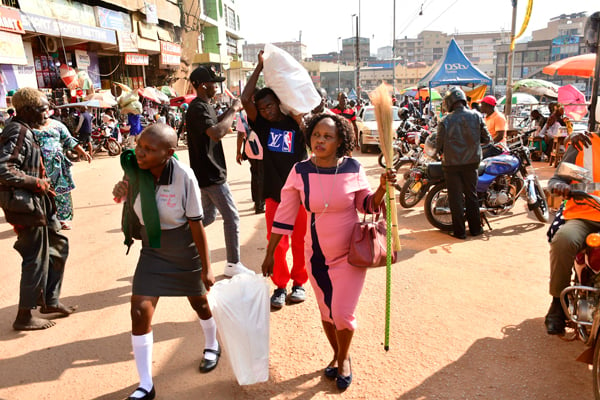Prime
Govt to borrow Shs100b to fight Covid pandemic

Ministry of Health officials led by Permanent Secretary Diana Atwine inspect the Covid-19 isolation facility set up at Mandela National stadium on September 7. PHOTO | ALEX ESAGALA
What you need to know:
- On Monday, Cabinet resolved to boost the country’s Covid-19 testing capacity, increase intensive care units (ICU) beds in 14 regional referral hospitals from 143 to 283 beds and provide personal protective equipment (PPE)s for the first responders at the border points and Entebbe airport.
Cabinet has authorised the Ministry of Finance to borrow $31.64m (Shs115.8b) from the African Development Fund (ADF) to boost government response in the fight against Covid-19.
On Monday, Cabinet resolved to boost the country’s Covid-19 testing capacity, increase intensive care units (ICU) beds in 14 regional referral hospitals from 143 to 283 beds and provide personal protective equipment (PPE)s for the first responders at the border points and Entebbe airport.
The loan seeks to finance the revenue shortfalls to strengthen Covid-19 outbreak response mechanisms and mitigate the social and economic impacts of the pandemic.
“Scale up laboratory testing capacity and diagnosis by at least 5 per cent through provision of testing kits, consumables and accessories. Strengthen and increase current ICU capacity with at least an additional 140 ICU beds equally distributed in 14 regional referral hospitals,” Mr Ssubi Kiwanuka, the public relations officer of International Relations, said in a statement.
Covid expenditures
This is not the first time government is earmarking funds to fight Covid-19 pandemic.
Last month, a report by Ministry of Finance budget monitoring and accountability unit, which Ministry of Health tasked the Finance ministry to clarify or withdraw, detailed that the overall budget for government’s multi-sectoral Covid-19 response between March and end of June was Shs2.2 trillion, out which Shs766.7b was received and committed towards Covid-19 prevention and response interventions.
The Ministry of Health last month, however, told Daily Monitor that by end of June it had received only Shs119b supplementary budget, complemented with off-budget commitments and expenditures by development partners.
Finance Minister Matia Kasaija is expected to table the loan request to Parliament for approval.
Another Shs215b was detailed as “in pipeline”, including Shs89b from government, Shs69b from Global Fund, and Shs56b pooled by both government and the World Bank’s Uganda Covid-19 Response and Emergency Preparedness Project.
Some of the outputs the Health ministry undertook included procurement of 38 ambulances at Shs11b through M/s City Ambulance Limited, among others.
Covid vaccines
According to Ministry of Health Covid-19 update to Cabinet, a vaccine request for nine million people costing $164m (at more than Shs600b) has been submitted and all conditions for receiving the vaccine have been fulfilled.
“The vaccines are expected in the country by April to May 2021. That persons at highest risk of severe disease and deaths like older person of 50 years plus (3,348,500) and persons with underlying health conditions would be prioritised among the first citizens to be vaccinated against Covid-19,” the statement reads in part.
The minister of Health, Dr Ruth Aceng, said they are still negotiating with the manufacturers for the government to buy vaccines directly and thus the price might change. She added that the allocation for vaccines will be in phases.
At least 63,284 government frontline health workers will be prioritised, including social workers, security personnel to ensure continuity of services.
Reopening of schools
Cabinet also approved development of response plans for the education sector to ensure continuous learning, investment plan to increase access to essential hygiene supplies and clean water to vulnerable populations.
Part of the loan will expand coverage of social assistance to the vulnerable population and informal sector.
According to Ministry of Health, school reopening for non-candidate classes should be informed by the epidemiology of the pandemic.
Asked about the laboratory testing capacity of the country, Prof Pontiano Kaleebu, the executive director of Uganda Virus Research Institute, said he could not establish the capacity by press time as new laboratories are accredited every other day.
Dr Sabrina Kitaka, a paediatrician, yesterday said for schools to reopen, SOPs have to be strictly followed.
“The Covid-19 situation is volatile and ambiguous, so we must be cautious as schools reopen. Keeping children out of school for more than a year creates its own complex situation. A proper guided reopening is what we all desire,” Dr Kitaka said.
Health ministry
Dr Ruth Jane Aceng, the Health minister, said the Ministry of Finance continuously mobilises funds to fill in the gaps.“It does not wait for the Ministry of Health request because not all of it will go to the Ministry of Health. The needs are continuous because Covid-19 is here to stay, so funds have to be mobilised to ensure we have what we need at all times,” she said.




